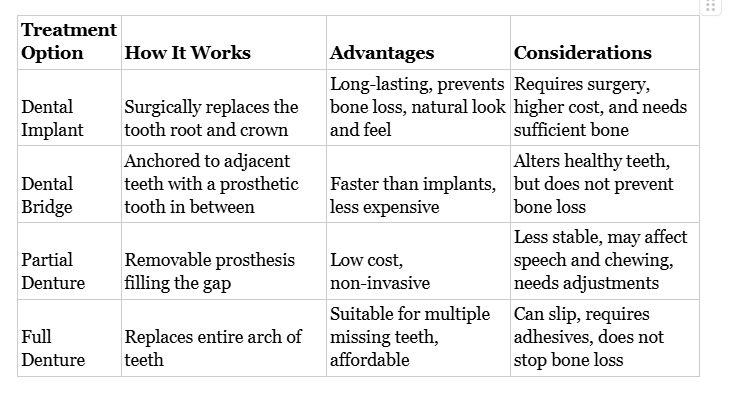Tooth loss can occur for many reasons, whether due to decay, gum disease, or trauma. While it may seem like a single missing tooth is not a major concern, the long-term consequences of failing to replace it can be serious. Beyond the obvious impact on your smile, oral health complications can spread over time, leading to additional dental problems. Modern dentistry now offers highly effective solutions, such as a dental implant in Leeds, that restore both function and appearance. Understanding what truly happens if a missing tooth is left untreated is vital for making an informed decision about dental care.
The Immediate Impact of a Missing Tooth
When a tooth is lost, neighbouring teeth no longer have the same structural support. Initially, this might cause only subtle spacing or minor changes in bite. However, over the first few months, the imbalance becomes noticeable. One common issue is the shifting of adjacent teeth, which results in misaligned bites and crowded or tilted teeth. This not only affects chewing but also makes oral hygiene more challenging.
A missing tooth can also alter the physical balance of your jaw. The way upper and lower teeth meet becomes uneven, which might eventually lead to discomfort when chewing and unnecessary wear on remaining teeth. The earlier treatment is sought, the smoother the correction process will be. Consulting an emergency dentist in Leeds often helps patients address unexpected tooth loss promptly and prevents further deterioration.
Long-Term Oral Health Consequences
Over the years, untreated tooth loss can lead to a domino effect throughout the mouth. The bone that once supported the tooth begins to shrink due to lack of stimulation, creating a sunken appearance in the jawline. This process, known as bone resorption, can complicate future restorative treatments. For example, a dental implant Leeds relies on a healthy jawbone foundation, and if too much bone loss has occurred, bone grafting may first be required.
Furthermore, once there is an unoccupied space in the dental arch, food particles and bacteria can accumulate more easily. This increases the risk of gum disease and tooth decay spreading to surrounding teeth. Missing teeth at the back of the mouth are especially problematic because they affect chewing ability, often leading to uneven wear or even fractures in other teeth.
Key Problems Caused by Untreated Tooth Loss
- Shifting of teeth: Neighbouring teeth drift into the gap, leading to misalignment.
- Bone resorption: The jawbone shrinks over time without the stimulation of a tooth root.
- Chewing difficulties: Missing teeth disrupt balanced eating habits and can strain digestion.
Aesthetic and Psychological Effects
The visible gap from a missing tooth can significantly affect confidence. People often find themselves reluctant to smile or speak naturally, which can impact personal and professional relationships. When front teeth are involved, the effect is even more noticeable, and many patients start to feel self-conscious around others.
Additionally, jawbone loss alters facial structure. Cheeks may appear sunken, and the overall facial profile can look prematurely aged. This emphasises why timely intervention is not merely a cosmetic choice but an important health decision. Treatments such as a dental implant in Leeds can restore both symmetry and self-esteem by returning the smile to its natural state.
The Role of Dental Implants
Dental implants remain one of the most reliable solutions for missing teeth. Unlike removable dentures or fixed bridges, implants replace not only the crown of the tooth but also the root. This means they actively stimulate the jawbone, preventing bone resorption. An implant is surgically inserted into the bone, where it naturally integrates over time. A lifelike crown is then attached, restoring both function and aesthetics.
Compared with other treatments, implants provide superior stability, durability, and comfort. They do not rely on healthy adjacent teeth like bridges do, nor do they move around like dentures. Many patients find that a dental implant in Leeds feels and functions very much like a natural tooth.

Benefits of Replacing a Missing Tooth
- Prevention of further oral complications: Protects against gum disease, decay, and additional tooth loss.
- Improved function: Restores natural chewing and speech ability.
- Enhanced aesthetics: Improves smile appearance and facial support.
Alternative Tooth Replacement Options
While dental implants stand out as the gold standard, other replacement methods are available depending on your circumstances. Bridges can replace a single missing tooth by anchoring onto adjacent teeth, though this does require modification of otherwise healthy teeth. Dentures, either full or partial, provide a more cost-effective solution and work well in cases of multiple missing teeth.
The choice of restoration depends on oral health, bone density, budget, and long-term goals. An emergency dentist in Leeds can often provide a temporary fix to protect the gap, but a long-term plan should always be discussed with your dentist to avoid later complications.
Comparison of Tooth Replacement Options

Why Timely Replacement Matters
The sooner a replacement solution is sought, the less invasive and complicated the treatment becomes. Early replacement prevents shifting, preserves jawbone health, and maintains natural oral function. For anyone who experiences sudden tooth loss through injury, contacting an emergency dentist in Leeds right away is the best step. Early intervention ensures fewer complications when choosing a long-term replacement option.
Prolonged delays can make treatments more complex, potentially requiring surgeries such as bone grafting or sinus lifts before implants can be placed. Choosing timely dental care ensures both predictable outcomes and sustainable oral health.

Restoring Confidence and Oral Health
The benefits of replacing missing teeth go beyond chewing efficiency and oral stability. Patients often report renewed confidence when smiling, speaking, or eating in public. With modern dental implant technologies and skilled care available locally, there is no need for anyone to live with the consequences of tooth loss.
Conclusion
Leaving a missing tooth untreated can trigger a chain reaction of oral health issues, from shifting teeth and gum disease to bone loss and altered facial appearance. Modern replacements, such as a dental implant in Leeds, allow patients to maintain both function and confidence while preventing long-term complications. If sudden tooth loss occurs, consulting an emergency dentist in Leeds offers the quickest way to protect oral health. For reliable treatment and advanced care, EDL is here to guide you through every step of restoring your smile.

